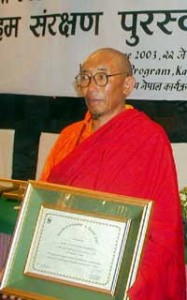
Karma Sonam Rinpoche
Rinpoche is one of the six individuals and four institutions being honored this year. “They serve as inspirational role models who add glory to Nepal’s history of conservation leadership,” said Dr. Chandra P. Gurung, Country Representative of WWF Nepal Program.
Born in Kham, Eastern Tibet, Rinpoche and his family and 40 other households came to Nepal following Chinese takeover of Tibet in 1959. Since then he has been living in Phoo Village in Manang.
“For the last 45 years Lama Karma Sonam Ringpoche [sic] has been involved in conservation in Phoo village, Manang, in Annapurna Conservation Area. His initial decision to stay at Phoo village was ruled out when he discovered that the villagers hunted and killed snow leopards. However, through his religious and personal beliefs, he could convince the villagers to stop killing this rare species. Furthermore, the villagers also assured him that they will not kill snow leopards, which made him decide to make Phoo his home,” a WWF Nepal release said.
“To illustrate the benefits of Lama Karma Sonam Ringpoche’s efforts recently, Professor Per Wegge has recorded the blue sheep herd in this area to be the largest in the world. Annapurna Conservation Area Project (ACAP) has also honored him with conservation award in 1994,” WWF Nepal added.
“In 1959, when the lama first arrived in Manang, blue sheep were rare and the locals had killed off most of the snow leopards to protect their livestock. For years, Lama Karma tried to convince the villagers of Phu that the Buddha teaches respect for all living beings. ‘All life is interconnected. What comes from the earth must return in a natural way, and killing does not permit this natural progression,’ he told them. With the snow leopards becoming increasingly rare, Lama Karma announced he would leave Phu for good. Reluctant to part with their guru, the villagers promised not to kill again. They have kept that promise to this day, and both the blue sheep and the snow leopards are back,” reported the Nepali Times in its June 20-26, 2003 issue.
Another recipient of the award this year is Omi Khangri Mother group of Yangma village, Walungchung Gola VDC of Taplejung District in Nepal.
According to WWF Nepal, the group members “are not only motivated, but also innovative. Yangma, which has easy access to Tibet, is rich in medicinal plants. As there are no police check posts beyond Yangma, this village is exposed to Medicinal and Aromatic Plants (MAPs) poachers especially from Tibet. Realising the need to address this issue, the mothers group of Yangma village took matters into their own hands. Omi Khangri Mother group disguised some local villagers as Nepali Policemen to scare the Tibetans away. It indeed is a bold step taken by the Mother Group.”
The awards presentation took place in Kathmandu, Nepal on June 5, 2003 to coincide with World Environment Day.
WWF Nepal instituted the Abraham Conservation Award in 1995 with generous support from WWF US board member, Ms. Nancy Abraham. The award provides an institutional mechanism to honor and recognize dedicated, “grassroots” conservationists in Nepal. In addition to public recognition, winners receive a cash award and certificates.

